2006 Retrospectacular
by Marc Hirsh
I worry about the strangest things. For the third
time in
the last eight years, I’m simply unable to pick a top album, and it ate
at me
for a while. But three times is a pattern, not an anomaly, so I’ve come
to
grips with the fact that there will be years when there’s no
overwhelming
favorite that claws its way to the top. (It doesn’t hurt that some of
my colleagues
at the Boston Globe acknowledged a
similar problem when listing their own top tens.) There were plenty of
albums
that I enjoyed this year, and if many of them could only sustain their
greatness half the time (some of which contributed widows and orphans
below),
that sure beats the vast majority of what finds its way to iTunes and
the
rapidly dwindling shelfspace of brick-and-mortars. The following eight
albums
would make fine additions to any of my previous Top Ten lists. All they
lack is
a leader.
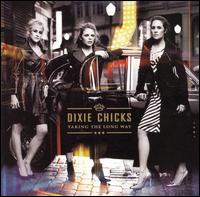
|
The Dixie
Chicks, Taking The Long Way (Open Wide/Columbia).
After everything that’s happened to them over the past few years, the
Dixie Chicks had to have known that making an album like Taking
The Long Way meant that there would be no going back, but there’s
not an ounce of hesitation to be heard anywhere. Offering a middle
finger to their attackers and a hug for their loved ones, they offer
not righteous anger but well-considered, perfectly modulated anger,
which is far rarer and infinitely more effective. It’s hard to know
whether country music will ever have them back; the genre has always
had room for independent-minded spitfires, but songs like “Lubbock Or
Leave It” and especially “Not Ready To Make Nice,” where Natalie Maines
is so angry that tears come to her eyes, may cut too close to the bone.
So be it. If Nashville
refuses to open its ears to the blue-eyed soul of “I Hope” or the
impossibly gorgeous harmonies of “Baby Hold On,” it’s their goddamned
loss. |
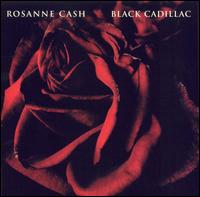
|
Rosanne Cash, Black
Cadillac (Capitol). It’s obvious by now that Rosanne Cash is
constitutionally incapable of making a bad album, but some are better
than others, and Black Cadillac is one for the plus
column. Having weathered a brutal period that saw her lose the people
from whom she got her very identity, Cash addresses the question of how
to live in her new world and structures her album like a wake, not a
funeral. There is pain (the title track, “The World Unseen”) but
there’s also spirited celebration of those being mourned (“World
Without Sound,” “Burn Down This Town”) and, in “God Is In The Roses”
and the concluding “Good Intent,” an understanding that our mortality
is one of the things that makes us human. So are our tears. |
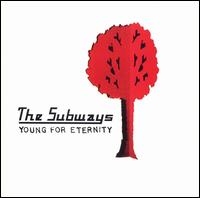 |
The Subways, Young For
Eternity (Sire). Sometimes excitement supersedes such niceties as
perfection and consistency, and no album and no band excited me with
their energy and explosiveness as the Subways did this year. Equally
adept at the dead simplicity of “Rock And Roll Queen” and “Oh Yeah” as
with the gradually unfolding headrush of “I Want To Hear What You Have
Got To Say,” the Subways got buried as hype steamrollers the Arctic
Monkeys nabbed all the press and publicity despite being inferior in
practically every way. Hell, even the Subways’ story – involving a
music fanatic barely in his twenties, his drummer kid brother and the
teenaged, bass-playing girlfriend that he’s loved for years – is
sexier. The Arctic Monkeys’ story is purely about money. |
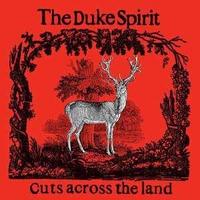
|
The Duke Spirit, Cuts
Across The Land (Star Time). It’s rare that any band has its sound
so honed down and distinctive that electric blitzkriegs like “Stubborn
Stitches” and “Lion Rip” can still sound like close siblings to
echo-laden slow-burners “Hello To The Floor” and “Bottom Of The Sea.”
The fact that the Duke Spirit reached that point with its first album
is just plain unnerving. |
 |
Jenny Lewis and the Watson Twins, Rabbit Fur Coat (Team Love). Rilo Kiley’s frontwoman may
have launched a thousand rock critic crushes, it’s true. But in a neat
reversal of the norm, it seems to be because her physical appearance,
rather than being the fuel that fires our ardor, doesn’t contradict the
illusion that we’ve created based on what we hear in her music and her
sublimely empathetic vocals. I initially greeted Rabbit
Fur Coat with disappointment after succumbing to the considerable
charms of Rilo Kiley’s More Adventurous, only to find
myself gradually warming to its charms over the course of the year,
thanks in no small part to the two times I saw Lewis and the Watsons in
concert. I finally got to see it as a collection of sweet and
occasionally heartbreaking songs that’s tethered to the folk (“Rabbit
Fur Coat”), country (“You Are What You Love”) and western (“Happy”)
traditions while still wandering far afield. Lewis gets most of the
credit, but Rabbit Fur Coat is indeed just as much a
triumph for Chandra and Leigh Watson, who reintroduce us to the art of
the backing vocal, deepening the self-fulfilling prophecy of “Melt Your
Heart” and turning “Born Secular” into atheist girl-group gospel. For
me, the sleeper of the year. |
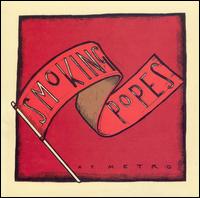 |
The
Smoking Popes, At Metro (Victory). A live reunion
album – the best of the Smoking Popes’ career, with sharp performances,
focused enthusiasm and almost perfect song selection – that portended a
delayed but well-deserved renaissance for a previously ignored band
that combined punk wallop with a sense of melody seemingly taken from
the pre-rock era. The second time the Popes played Boston
after its release, they could barely fill a quarter of the club. I hope
you enjoyed it while it lasted, fellas. |
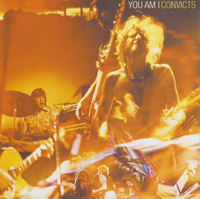
|
You Am I, Convicts
(EMI Import). Australia’s best band’s worst album was emblematic of the
aforementioned problem that I had with so many of the albums that I
enjoyed this past year, in that half of it came and went with barely a
wave, no matter how many times I tried to get its attention. So why
does You Am I make the list when, say, Regina Spektor doesn’t?
Tradition, mostly, though it certainly helps that songs like “Thuggery”
and “By My Own Hand” light a fire under bandleader Tim Rogers, who is
tired enough of being a drunken mess that he pulls out of it with the
help of his mates while still longing for it enough to write paeans to
the condition of being a drunken mess. It comes out in the U.S.
in a few months, so don’t bother searching for the import unless you
want the live Convict Stain bonus disc. Which you
probably should. |
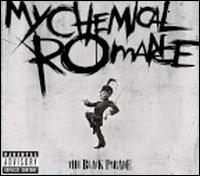 |
My Chemical Romance, The
Black Parade (Reprise). a.k.a. Ashes To Ashes, Ziggy
Stardust to Ziggy Stardust. Admittedly, I don’t know how this
glam-punk concept album about making some sense of (and giving some
meaning to) death is going to hold up, as I’ve only listened to it for
the first time with less than 14 hours to spare until 2007 comes
knocking. But even though I know I run the risk of jumping the gun (at
this moment in time, I lack the proper data to decide whether
“Teenagers” is funny, disturbing or crass marketing to a naïve
demographic, or possibly all three), to my ears, it’s already better
than American Idiot. |
Widows
and orphans:
1) Regina Spektor, “Apres Moi,” live at Avalon in Boston,
October 6. I was more than a little relieved that the swell Begin
To Hope ultimately wasn’t strong enough to grab the #1 position
this year, since if topping my list with quirky, piano-playing women
three times is a pattern, then four makes a fetish. “Apres Moi” is
a
gem in its recorded version, but onstage, Spektor gave it the epic
treatment that it deserves. From the solo-piano beginning to the
full-band bombast later on, with guttural noises punctuating Spektor’s
vocal and an interlude in Russian along the way, the thing felt like
the world was threatening to come crashing down around our heads. There
are certain transcendent moments that I always look for but rarely get
from live performances. Spektor nailed hers.
2) Christina Aguilera, “Ain’t No Other Man.”
Here’s what’s wrong with Rtina’s speakeasy hip-hop funk track: a by-now
mandatory tendency to oversing the thing, the gleeful dorkiness
disguised as strut on the line “You’re badass,” the curious fact that
she sings “Something moved me deep inshide.” Here’s
what’s right about it: every blessed thing, including the above.
“Dirrty” tried so hard to announce that Aguilera had gotten laid
proper. “Ain’t No Other Man” is actually convincing. Ebullience can be
a beautiful thing.
3) The Secret Machines, “Lightning
Blue Eyes.” In which the band’s robot heart suddenly gets what human
love is all about and starts rhapsodizing about it before it can
remember that it’s made of nothing but circuits and wires.
4) Damone, “Out Here All Night.” In
early September, I named the relentless, razor-sharp title track to
Damone’s second album Song
Of The Day. Three weeks later, it won Song
Of The Year at the Boston Music Awards. Way to steal my thunder, jerks.
5) Ray Davies, “Stand-Up Comic.” The
title track to Other
People’s Lives, Davies’s first
collection of new material since I was a teenager, was dull, obvious
and hamfisted, and the placement of “Stand Up Comic” immediately
afterwards seemed to indicate that he knew it. Sharp, funny and
insightful, it took the exact same subject matter – the obeisance of a
populace numbed by media overexposure to matters of little import – and
turned it into a marvelously nasty and satirical gem with the added
shock of an actual call to action. The Georgie Fame groove didn’t hurt
a bit, either.
6) World/Inferno Friendship Society,
“Brother Of The Mayor Of Bridgewater.”
Most erudite punks are content just to read Lipstick Traces.
World/Inferno Friendship Society is actually doing something about it.
7) Nellie McKay, “Gladd.” It’s strange
to catch her being lucid for a change, though it’s probably a more
sustainable career path (to say nothing of her mental health). Where
most folks talk about what they want played at their funerals, McKay
has decided that she’ll be singing to her mourners from beyond the
grave herself, thank you very much.
8) Gnarls Barkley, “Crazy.” Well,
sure. Just think: two years ago, Danger Mouse was at risk of being shut
down completely, thanks to his creatively brilliant, legally dubious
Jay-Z/Beatles mashup. Now he runs the place. Copyright law is for
losers, kids.
9) Rainer Maria, “Terrified.” I
have yet to hear a Rainer Maria album that thrills me nonstop, start to
finish. I also have yet to hear one that fails to thrill me at all. Catastrophe Keeps Us Together upped the band’s average
over the last two studio jobs, and “Terrified” was part of the
reason, a sweet and gentle recognition of vulnerability that singer
Caithlin De Marrais vows never, ever to take advantage of.
10) Tool, “Vicarious.” I could be
mistaken, but I thought I saw the air around my stereo rippling the
first time I played this. Discomfiting, to be sure, but once I found
its wavelength, I just rode the thing to safety.
 |
When I started playing guitar in the
late 1980s, one of the
recurring themes than ran through the guitar magazines that I bought by
the
pound was the superiority of the guitarists that found themselves in
the employ
of Steely Dan over the years. (The lack of praise for the exact same
guitarists’
work with Joni Mitchell quietly underlined another recurring theme.)
But no
matter how much my interest in learning about my new hobby opened my
eyes to
bands like AC/DC, Metallica and Van Halen, all of which I had
previously
disregarded, I could never crack the shell surrounding what Steely Dan
was
doing. And so, despite the vinyl copy of Aja
that I have no idea how I acquired (I can guarantee that I didn’t buy
it, that’s
for sure) and my adoration of “Rikki Don’t Lose That Number,” I closed
the door
on them. So why have I suddenly fallen in love with Pretzel
Logic (MCA, 1974) and given it this year's Better Late
Than
Never Award? Beats me; my
best guess is that I’m
finally old enough to both appreciate and look beyond the collegiate
smartassery of what Steely Dan doing in their mixing of jazz melodicism
and pop
structure (though it should be noted that both Walter Becker and Donald
Fagen
were in their mid-20s when they pulled it off). The entire first side
(or what
was once considered same) is some kind of marvel, veering from the
atypically
openhearted romanticism of “Rikki” to the cynical, biting funk of
“Night By
Night” to the gentle but unresolved “Any Major Dude Will Tell You” and
so on
and so forth. The playing is immaculate, of course; even the band’s
detractors
(including me, way back when) admitted that. But even with that and a
passel of
strong songs, it’s Fagen’s vocals that really shine. Afflicted with a
voice
that would get him mocked during the first week of American
Idol, he spots his limitations, learns how to use them to
his advantage and becomes devastatingly expressive in the process. If a
man
that sounds like Fagen becoming one of the best singers of the 1970s
isn’t pretzel
logic, then I don’t know what is. |
Back to album reviews









